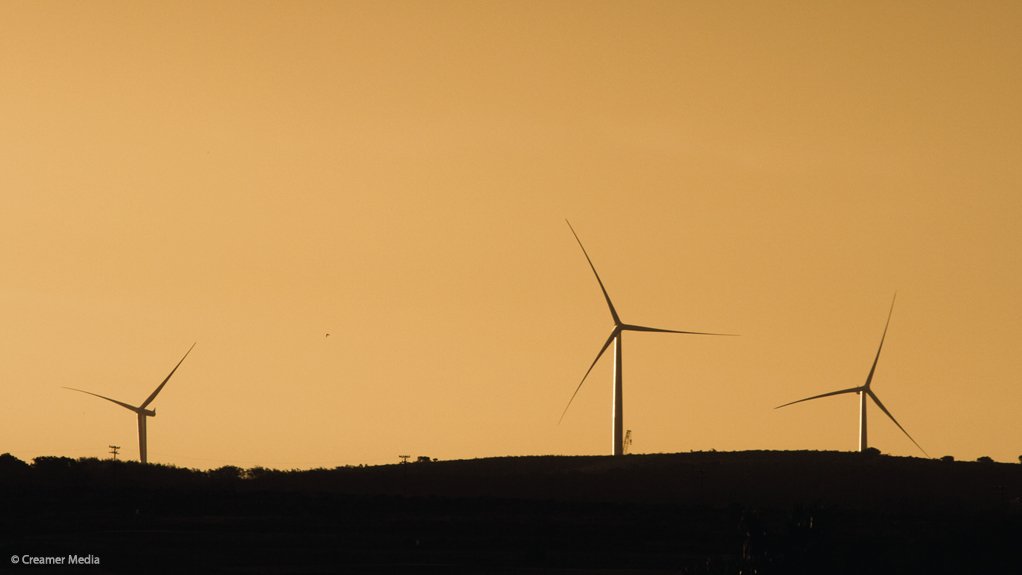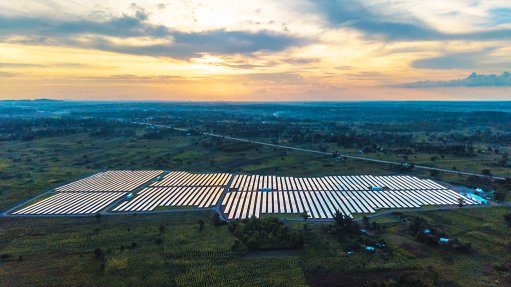Government asks renewables IPPs to voluntarily lower tariffs
Mineral Resources and Energy Minister Gwede Mantashe and Public Enterprises Minister Pravin Gordhan met with independent power producers (IPPs) on Friday to request that they consider voluntarily lowering the tariffs associated with power plants procured during the first three bid windows of the Renewable Energy Independent Power Producer Procurement Programme (REIPPPP).
The meeting, which included more than 100 participants, followed a similar engagement with the country’s coal miners, during which government proposed a new price-setting mechanism for domestic coal in a bid to place a cap on the price Eskom is paying for the energy mineral.
In a statement, the Department of Mineral Resources and Energy (DMRE) said the meetings, which took place on September 26 and 27, formed part of government’s ongoing engagements with stakeholders to discuss the state of the economy and the role of electricity in contributing to economic growth in key sectors such as mining, manufacturing and energy.
Although Mantashe had, for some time, been signalling his desire to review the renewables tariffs the official invitation to the IPPs was delivered only one day ahead of the actual meeting.
During the meeting, IPPs were told that rising electricity tariffs were placing strain on the economy generally and on energy intensive companies in particular.
The Ministers requested the IPPs to voluntarily formulate a mechanism for lowering the tariffs and indicated that government would be willing to consider extending power purchase agreement (PPA) periods.
Some IPPs have previously expressed a willingness to discuss a solution whereby the value created through a ten-year extension to the prevailing 20-year PPA term be used to lower the tariff paid by the Single Buyer Office, which resides within Eskom.
Others, however, have warned that changing contractual terms midstream would send a negative signal to investors and could also undermine the credibility of the REIPPPP, through which more than 6 300 MW of renewables capacity has been procured since 2011 across over 100 separate projects. The REIPPPP has also helped to stimulate some R200-billion-worth of investment in the domestic power sector.
Government also raised concern over the current guarantee framework provided by the National Treasury to Eskom for the purchase of electricity from the IPPs.
It does not appear, however, that the Ministers raised the argument that the IPPs were weakening Eskom's financial position. Mantashe has argued previously that it was not sustainable for Eskom to continue paying over R2.00/kWh to IPPs, while charging a tariff of about R0.9/kWh as determined by the regulator.
The IPPs have repeatedly dismissed this argument, noting that the National Energy Regulator of South Africa, which sets Eskom’s tariff, has not once questioned the prudency of the IPP-related costs included in Eskom’s allowable-revenue applications. The costs are, thus, treated as pass-through items, making them cost and profit neutral to the utility.
The IPPs have also noted that renewables tariffs have fallen in each successive bid window, having started high largely owing to the immature state of the industry at the time when the first projects were procured. At that point, solar photovoltaic (PV) costs were still relatively high, but have since fallen steeply, while wind costs have consistently declined over the period.
During the first bid window, tariffs secured for wind were R1.67/kWh, while they were R4.02/kWh for solar PV. By the second bid window, solar PV tariffs had fallen to R2.40/kWh, while those for wind had declined to R1.31/kWh. The decreases continued into bid windows three and four, falling to R1.28/kWh for solar PV and R0.96/kWh for wind in round three and to R1.00/kWh and R0.82/kWh for solar and wind respectively in round four.
During the ironically named ‘Expedited Round’ of the REIPPPP, which was never concluded, the average tariff bid for both solar PV and wind was R0.62/kWh.
In its statement the DMRE said the IPP roleplayers had committed to engage further and to “create working mechanisms to take these discussions forward in a positive and collaborative manner”.
POSITIVE ‘OPEN’ DIALOGUE
South African Renewable Energy Council (SAREC) chairperson Terence Govender told Engineering News Online that the meeting with the Ministers had been a positive “open dialogue” and that no instruction had been made to IPPs to lower their tariffs.
He confirmed, however, that the reduction of IPP tariffs had indeed been raised by government as one of the options for consideration by the industry to support South Africa’s economic recovery.
Government had requested SAREC to act as the conduit for future engagements with government, which would be establishing a dedicated task team to consider any proposals made by the IPPs for the stimulation of growth in the South African economy and for lowering the electricity cost burden to consumers.
SAREC would meet on October 1 to draft its proposals and a follow-up discussion with Mantashe, Gordhan and the task team had been scheduled for October 4.
Besides dealing with government's request for tariff proposals, SAREC would outline the economic, industrial and energy benefits of moving expeditiously with Bid Window Five of the REIPPPP as soon as the updated Integrated Resource Plan (IRP) had been approved by Cabinet.
Owing to the steep fall in solar PV and wind technology costs since the Expedited Round of 2014, the projects procured during REIPPPP Bid Window Five should help lower the average tariff paid by the Single Buyer Office to the renewables IPPs.
The additional generation would also shore up supply at a time when the supply-demand balance had become vulnerable again, largely because Eskom's existing coal fleet was struggling to meet the lowered energy availability target of 70%, and because the new units at the Medupi and Kusile plants were performing below nameplate capacity.
The IRP is expected to receive Cabinet approval during the course of October.
Comments
Press Office
Announcements
What's On
Subscribe to improve your user experience...
Option 1 (equivalent of R125 a month):
Receive a weekly copy of Creamer Media's Engineering News & Mining Weekly magazine
(print copy for those in South Africa and e-magazine for those outside of South Africa)
Receive daily email newsletters
Access to full search results
Access archive of magazine back copies
Access to Projects in Progress
Access to ONE Research Report of your choice in PDF format
Option 2 (equivalent of R375 a month):
All benefits from Option 1
PLUS
Access to Creamer Media's Research Channel Africa for ALL Research Reports, in PDF format, on various industrial and mining sectors
including Electricity; Water; Energy Transition; Hydrogen; Roads, Rail and Ports; Coal; Gold; Platinum; Battery Metals; etc.
Already a subscriber?
Forgotten your password?
Receive weekly copy of Creamer Media's Engineering News & Mining Weekly magazine (print copy for those in South Africa and e-magazine for those outside of South Africa)
➕
Recieve daily email newsletters
➕
Access to full search results
➕
Access archive of magazine back copies
➕
Access to Projects in Progress
➕
Access to ONE Research Report of your choice in PDF format
RESEARCH CHANNEL AFRICA
R4500 (equivalent of R375 a month)
SUBSCRIBEAll benefits from Option 1
➕
Access to Creamer Media's Research Channel Africa for ALL Research Reports on various industrial and mining sectors, in PDF format, including on:
Electricity
➕
Water
➕
Energy Transition
➕
Hydrogen
➕
Roads, Rail and Ports
➕
Coal
➕
Gold
➕
Platinum
➕
Battery Metals
➕
etc.
Receive all benefits from Option 1 or Option 2 delivered to numerous people at your company
➕
Multiple User names and Passwords for simultaneous log-ins
➕
Intranet integration access to all in your organisation





















